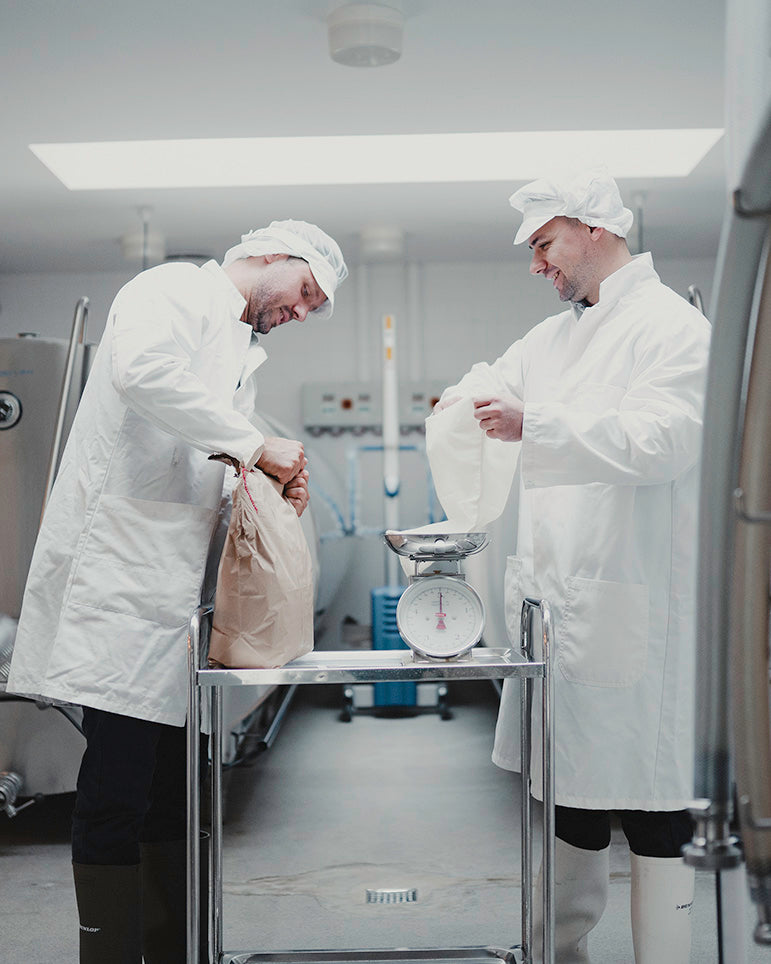What is Vita Biosa?
Vita Biosa is an organic shot fermented with cultures of bifido- and lactic acid bacteria, along with an extract from 19 different herbs. Vita Biosa is vegan, unpasteurized, and free of milk, sugar, and gluten.
Which herbs is Vita Biosa fermented with?
Vita Biosa is fermented with the following 19 different herbs: aniseed, basil, fenugreek, dill, juniper berries, fennel seeds, elderflower, ginger, chamomile, angelica root, chervil, licorice root, oregano, peppermint, parsley, rosemary, sage, stinging nettle, thyme.
Which bacteria cultures is Vita Biosa fermented with?
Vita Biosa is fermented with 8 bifido- and lactic acid bacteria: Bifidobacterium lactis, Bifidobacterium longum, Lactobacillus acidophilus, Lactobacillus casei, Lactobacillus rhamnosus, Lactobacillus salivarius, Lactococcus lactis, Streptococcus thermophilus.
Does Vita Biosa contain milk?
No. Vita Biosa contains lactic acid bacteria, which are often associated with dairy products, especially yogurt. These bacteria are named as such because they convert carbohydrates into lactic acid, among other substances. Therefore, they have nothing to do with milk, and Vita Biosa can be consumed by those with milk allergies or lactose intolerance.
Does Vita Biosa contain gluten?
No, none of the ingredients in Vita Biosa contain gluten, so Vita Biosa is gluten-free.
Does Vita Biosa contain sugar?
No, as a finished product, Vita Biosa is free of sugar. We use organic molasses in the fermentation process, but during fermentation, the lactic acid bacteria convert the sugar content into organic acids, meaning Vita Biosa is sugar-free when bottled.
Does Vita Biosa contain licorice?
Yes, there is extract from licorice root in all of our variants. The amount of licorice root extract varies between our taste variants, but what they all have in common is that the content is very low. The amount of licorice is highest in Vita Biosa Berry. In Vita Biosa Original and Vita Biosa Ginger, there is a total of 0.5% herbal extract – of this, 9% is licorice root, which corresponds to 0.045% licorice root in Vita Biosa Original or Vita Biosa Ginger. In a daily dose of 30 ml, this means there will be 0.014 ml of licorice root. Therefore, the amounts are relatively small, but if your blood pressure is very sensitive, we recommend consulting your doctor.
What are lactic acid bacteria?
Lactic acid bacteria, more commonly referred to as probiotics, are defined as: live microorganisms which when administered in adequate amounts confer a health benefit on the host". These cultures often include strains such as lactobacillus and bifidobacteria.
What are organic acids?
Organic acids have a biological origin and are naturally found in the intestines, where they are formed by, for example, lactic acid bacteria. In Vita Biosa, the organic acids are present in the form of, among others, lactic acid and acetic acid, which help give the drink its unique sour taste while also making it self-preserving. Therefore, we do not need to add preservatives to our products.
Is Vita Biosa vegan?
Yes. All of our Vita Biosa variants are registered with the Vegan Society, the world's oldest vegan association. This guarantees that our products are completely free from animal ingredients.
Is Vita Biosa certified organic?
Yes! All our Vita Biosa variants are organically certified and carry both the Danish red Ø label and the green EU label.
See our certificates.
What is fermentation?
Fermentation with lactic acid bacteria is a process where the lactic acid bacteria convert substances such as molasses into lactic acid and acetic acid.
When should I drink Vita Biosa?
Vita Biosa can be consumed at any time, and it's recommended to drink it several times daily. Some people prefer to drink it on an empty stomach, while others prefer to drink it with meals.
Should I drink Vita Biosa straight or mixed with something?
You can drink Vita Biosa straight or enjoy your daily shot mixed with water, juice, or smoothies. However, be aware that you should only mix Vita Biosa into your drink just before consuming it.
Can I drink Vita Biosa while taking antibiotics?
Antibiotics work by killing bacteria, which will also affect the lactic acid bacteria in Vita Biosa. However, antibiotics have no impact on the organic acids and herbal extract content.
Can I drink too much Vita Biosa?
We recommend drinking 30 ml at a time, but if you feel you would like to drink a little more, feel free to do so.
Is it normal for Vita Biosa to form pressure?
Yes, it is perfectly normal for Vita Biosa to occasionally form pressure. You may notice pressure in the bottle before opening, as it feels hard or bulges, and when you taste the drink, it may feel slightly sparkling. This is not a sign of deteriorated quality.
Is Vita Biosa unpasteurized?
Yes. Vita Biosa is naturally self-preserving, as organic acids (including lactic acid and acetic acid) are formed during the fermentation process. These acids not only give the product its unique sour taste but also lower the pH, preventing the growth of harmful bacteria. Pasteurizing Vita Biosa is therefore unnecessary.
Can I drink Vita Biosa while pregnant or breastfeeding?
The short answer is yes, but every pregnant or breastfeeding body is different. Therefore, it is important to consult your doctor, midwife, or health visitor for personalized advice.
Can children drink Vita Biosa?
Yes, children can drink Vita Biosa, but we recommend starting with smaller amounts than for adults. For adults, we recommend a shot of 30 ml one or more times daily. For children from 1 year old or children who have never drunk Vita Biosa before, we recommend starting slowly with a dose of 5-10 ml once a day. This will allow the body to gradually adjust to the lactic acid bacteria. After a while, and if needed, the dose may be slightly increased. Both children and adults can drink Vita Biosa undiluted or mixed with, for example, water, smoothie, or juice, to be consumed immediately after mixing.



